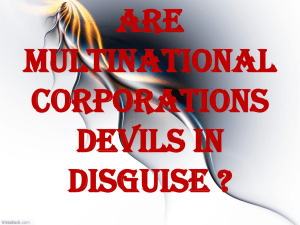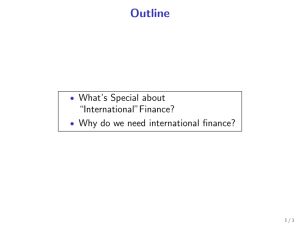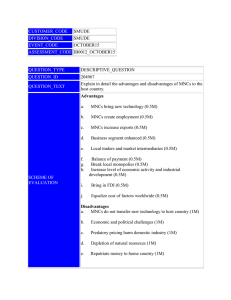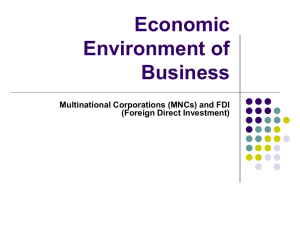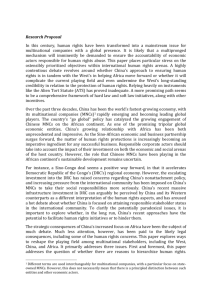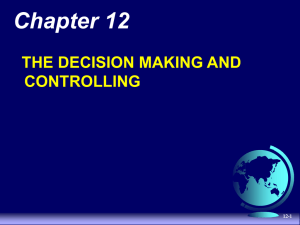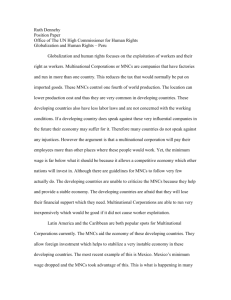“ Corporate Social Responsibility: A Myth? Germany”
advertisement
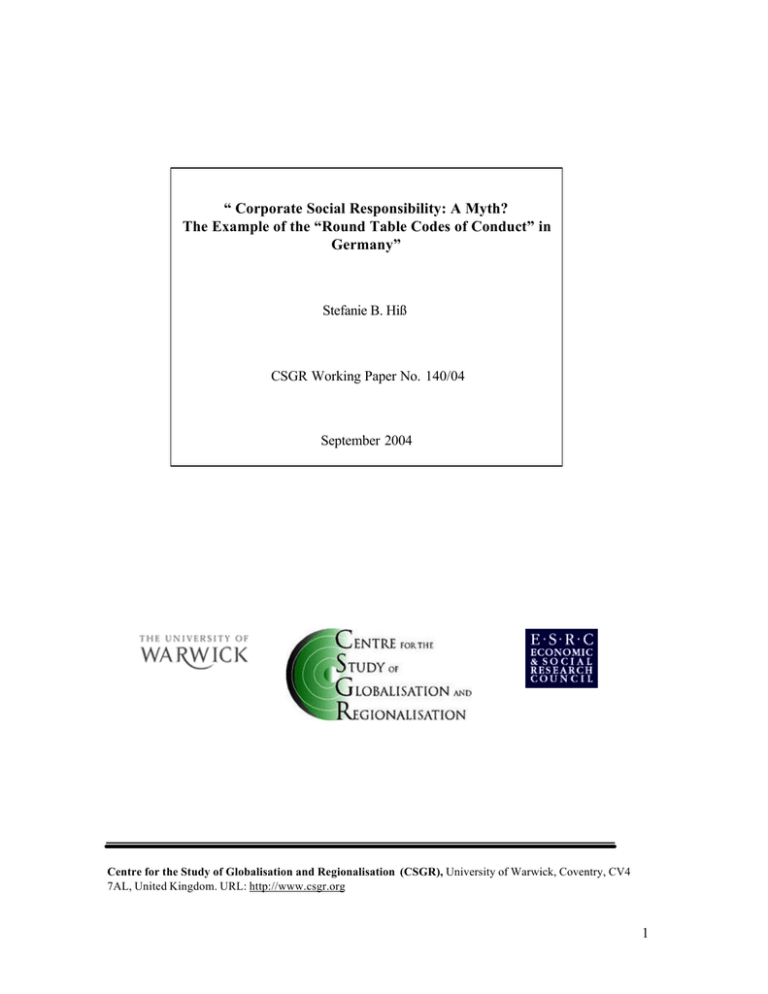
“ Corporate Social Responsibility: A Myth? The Example of the “Round Table Codes of Conduct” in Germany” Stefanie B. Hiß CSGR Working Paper No. 140/04 September 2004 Centre for the Study of Globalisation and Regionalisation (CSGR), University of Warwick, Coventry, CV4 7AL, United Kingdom. URL: http://www.csgr.org 1 Corporate Social Responsibility: A Myth? The Example of the “Round Table Codes of Conduct” in Germany Stefanie B. Hiß Marie Curie Fellow, CSGR, University of Warwick CSGR Working Paper No. 140/04 September 2004 Abstract This paper is concerned with why and how multinational companies (MNCs) voluntarily engage in Corporate Social Responsibility (CSR), especially in social standards. The first part describes the prevailing perspectives on the CSR debate. Then, with the New Institutionalism in Sociology, an alternative view on CSR is discussed. The third part develops the argument that the ‘traditional’ rational institutional myth developed by Meyer and Rowan should be replaced or supplemented by a CSR myth. After that, the case study of “Round Table Codes of Conduct” provides an example of how MNCs deal with this emerging CSR myth. Keywords: Multinational Companies, Corporate Social Responsibility, Social Standards, New Institutionalism in Sociology, ‘CSR-Myth’, Multi-Stakeholder Forum, Round Table Codes of Conduct, Transparency Address for correspondence: Stefanie Hiß Graduiertenkolleg „Märkte und Sozialräume in Europa“ (Research Training Group “Markets and Social Systems in Europe”) Otto-Friedrich-Universität Bamberg Lichtenhaidestr. 11 96052 Bambe rg, Germany Phone: +49 (0)951 2971216 Email: Stefanie.Hiss@gmx.de or stefanie.hiss@sowi.uni-bamberg.de Homepage: http://www.uni-bamberg.de/sowi/mse/kollegiaten/englisch/hiss_engl.html 2 Introduction This paper endeavours to answer the question concerning why and how do multinational companies (MNCs) voluntarily engage in Corporate Social Responsibility (CSR), especially in social standards? This question arises in the following context: In a globalised world MNCs1 are becoming increasingly important and powerful and, as global players, have in principle the freedom to ‘enter’ or to ‘exit’ national economies in order to maximise the well-being of their shareholders. More than half of the 100 largest economies in the global economy are MNCs and not nation states. MNCs act within global networks and the combined sales of the world’s top 200 corporations already account for more than a quarter of all worldwide economic activities (Anderson/Cavanagh 2000:1f). It is because of these developments that the working conditions of the majority of employees and self-employed workers are constantly changing. The World Bank estimates that in 1970 two thirds of all employees were not integrated into the world market. By 2000 this figure had fallen to about ten percent (World Bank 1995:50). While increased competition, on the one hand, implies an opportunity for increasing the prosperity for the employees, it also may lead to worsening working conditions, especially in developing countries. According to Scherrer and Greven, around ten percent of the total value of the commodities in the world market is produced in violation of fundamental workers rights (Scherrer/Greven 2001:124). Especially in countries where these fundamental workers rights are violated, the productivity is comparably low, so that the percentage of such workers is supposedly much higher. In that way, the problem of social dumping is a consequence which is especially noticeable in branches working with unskilled workers in developing countries. It is because of this that the issue of CSR arises in academic and public debates. In the last decade, it is not only the voluntary engagement of MNCs in CSR that has increased, 1 This paper conceives MNCs in accordance with Dunning’s broad definition: “A multinational or transnational enterprise is an enterprise that engages in foreign direct investment and owns or controls value adding activities in more than one country” (Dunning 1993:3). This paper generally focuses upon those private-sector and profit oriented MNCs that have their home base in an industrialised country and produce mainly in developing countries. 3 the expectation of CSR in society has increased also. Contrasting the social expectations of society with the social performance of MNCs, Carroll even claims that the gap between the actual social performance of companies and society’s expecta tions of MNCs’ social performance widened between the 1950s and 1980s (Carroll 1984:5). Nevertheless, the reason why the voluntary engagement of MNCs has increased and how MNCs deal with CSR still stands in question. For CSR a wide range of definitions can be found (e.g., Joyner and Payne 2001, Utting 2000, van Marrewijk 2003, Vives 2004). Different organisations have different definitions, even if there is considerable common ground between them. It is my view that CSR is exercised when MNCs not only try to maximize the well-being of their shareholders, but also behave responsibly to other stakeholders, such as their employees or customers. Likewise, as far as I’m concerned, CSR can be the result of either a voluntary engagement or a law-enforced one. The term CSR is frequently interpreted or translated quite differently so that the “social” of Corporate Social Responsibility comes to stand for an environmental as well as social responsibility. Nevertheless, my focus will be on the social responsibility, especially on social standards as one part of CSR. To clarify the debate about ‘social standards’ or ‘labour standards’, the following distinction is usually made: On the one hand, the broad term ‘social standards’ is used more generally in the literatur e as a comprehensive term for minimum standards with respect to the provision of labour contracts (e.g., working time, wages, social insurance, etc.) and labour rights (Scherrer et al. 1998:12 quoted in Windfuhr 2004). On the other hand, the more specific term ‘core labour standards’ refers to the definition of the International Labour Organisation (ILO) (Windfuhr 2004:105). In their ‘Declaration on Fundamental Principles and Rights at Work’ the ILO identified seven, now eight, key conventions as ‘core labour standards’. The Declaration covers four areas: Freedom of association and the right to collective bargaining; the elimination of forced and compulsory labour; the abolition of child labour; and the elimination of discrimination in the workplace (Interna tional Labour Organization n.d.). The implementation of social standards may be conceived in various ways that are more or less voluntary. 4 In a less voluntary way, social standards can be integrated into international trade agreements as so-called social clauses (Scherrer/Greven 2001). Accordingly, MNCs would behave in a socially responsible way if they respect the common law. However, it could be seen in Doha that the integration of social clauses into the World Trade Organisation Framework is not a realistic scenario in the short term (Reichert 2004:9). Another example of an international organisation concerned with social standards is the aforementioned ILO. Until now, the ILO has rather developed a framework of reference, as there is no real pressure for an implementation of the ILO conventions, due to a lack of mechanisms for sanctioning (Reichert 2004:13f). These are two, rather unsuccessful, examples to regulate the social behaviour of MNCs with the help of law-enforcement on an international level. National law initiatives also have their limits because of the already mentioned international flexibility of MNCs to choose and change a location for their production when it is advantageous to do so. Therefore, it seems promising to have a closer look at the more voluntary engagement of MNCs, which is not law enforced. There are several large-scale as well as small-scale initiatives, some of which are quite well-known, for example the UN Global Compact (United Nations Global Compact Office n.d.), the OECD Guidelines for Multinational Enterprises (OECD 2001) and the SA 8000 (Reichert 2004:20ff, Social Accountability International n.d.). Basically, they focus on the diffusion of different so-called ‘codes of conduct’, aiming at self -imposed obligations of MNCs. These codes of conduct are catalogues and can regulate a wide range of aspects, for example social standards. Most of the codes of conduct concerning social standards include the ILO ‘core labour standards’ (Wick 2003:68ff). Furthermore, they can be developed by a company on its own, or together with unions, or Non-Governmental Organisations (NGOs), or other multi-stakeholder groups (Nadvi/Wältring 2002:23, Urminsky 2001:10). There is a huge variety of codes of conduct that not only concern the included standards but also the aspects of monitoring. In the last decade, codes of conduct that include social standards increased considerably in number. Some only seem to be ‘lip-services’ by the MNCs, others are controlled by a more or less independent monit oring system, but mostly they are not very detailed and precise (Reichert 2004:1ff). In this context one key question has to be addressed: Why do MNCs engage ‘voluntarily’ with social standards and, for example, implement a code of conduct? Usually, the implementation and monitoring of codes of conduct is an expensive task and involves a lot of 5 investment from the MNCs. As most of the MNCs are listed on the stock market, shareholders will have a close eye on the finances and expenditures of the MNCs. Nevertheless, codes of conduct have also increased in MNCs that are shareholder value oriented and therefore are very much interested in their profit. Why is it that these profit oriented companies engage voluntarily in codes of conduct? What are their motivations, incentives or interests? To find an explanation for this phenomenon I will firstly show how the prevailing theories of CSR deal with this question. The Prevailing Perspectives on the CSR Debate The prevailing perspectives on the CSR debate are very broad and often not clearly structured. I will therefore try to clarify the nature of the various approaches. I wish to draw the following distinction, and propose that, in the prevailing scientific debate on social standards, MNCs are confronted by two different kinds of demands. On the one hand, the business ethical approach on MNCs wants companies to behave morally. They are asked to, mainly voluntarily, take account of their social responsibilities. On the other hand, there is an economic perspective, which claims that social standards have to be economically efficient to be implemented voluntarily by MNCs. Following this logic, a positive correlation between economical performance and social standards can be seen as a sustainable basis for the diffusion of the latter. In what follows, I wish to discuss the relevance of these two demands for the overarching theme of this paper. Firstly, I will discuss the business ethical approach. Within the wide range of business ethical theories, it can be distinguished between a more normative and a more descriptive ethic. There is not only a normative formulation of what is a useful and fair behaviour, but also a descriptive approach that describes existing values and norms (Kreikebaum et al. 2001:7). In this paper the normative approach will be neglected. Generally, the descriptive approach endeavours to provide interpretations that explain and illuminate the underlying values and norms of the CSR activities. The proponents of this view thus focus more on the values and norms as such, as opposed to the interaction between MNCs and their societal environment. However, concerning the question of voluntary social standards, the clash of contradictory and inconsistent expectations of different stakeholders can be seen as a key conflict for a MNC. The business ethical approach might be useful for some types of companies, such as, for example, traditional family led firms, which are more open to socially responsible 6 behaviour or more philanthropic or altruistic engagement, especially when they do not have to defend their strategies against shareholder value interests. But, for a company confronted with the demands of shareholders, altruistic behaviour without a positive correlation to profit cannot be the dominant strategy. When their ethical ideals clash with their need for profit they will normally not decide in favour of ethical behaviour. Also, when they implement social standards for improving their reputation, this cannot be adequately described as ethically motivated. Therefore, for profit and shareholder oriented MNCs, this business ethical approach does not seem to be a sufficient explanation. Instead, in order to analyse the interactions and conflicts between MNCs and their stakeholders, it seems more promising to work with sociological theories. Secondly, I will discuss the economic perspective claiming that CSR has to be economically efficient to be implemented by MNCs. Following this logic of argumentation, a positive correlation between economical performance and CSR or social standards can be a sustainable basis for the diffusion of the latter. But, very often, social standards have a positive impact on the profit only in the long term and only in a very diffuse way. For a wide range of social standards it is almost impossible to maintain that their implementation has a direct positive impact on the profit of a MNC. For example, the repression of unions can prevent strikes or child workers can be paid with low wages. Although it might be difficult to establish a clear correlation between the implementation of social standards and profit making, companies could aim at raising their reputation by implementing social standards, in order to possibly gain profits - or at least not to make losses - from this reputation, at a later point in time. Sometimes it is the fear of a NGO campaign against the company and the correlated damage of reputation, and then the loss of profit, that makes MNCs more sensitive to social standards. However, this is a more indirect impact. To find a more explicit example of this, I will show the influence of reputation in connection with Socially Responsible Investing (SRI) – a phenomenon that is becoming increasingly important. SRI could be interpreted as proof of a positive correlation of social standards and economical performance, because sustainable indices often perform better than the traditional indices. Examples for sustainable indices are the Dow Jones Sustainability Index (DJSI) or the FTSE4Good (Sparkes 2002:300ff). However, the reason why they perform better is not necessarily the fact that they (would) respect social standards. Instead, there is an 7 environment that prefers to invest in these MNCs that are, for example, listed on the stock market in such a sustainable index. Mainly, two kinds of investors can be distinguished: (a) The profit oriented but risk-averse investor with a long term perspective: The more MNCs have to face the threat of campaigns against their working conditions, the more these investors look for the adherence to social standards as a signal for stability and future profits. In this sense, social standards seem to be a kind of assurance against campaigns and a bad reputation. (b) The ethically oriented investor: He prefers such a SRI, because of the underlying values and norms. Companies need to fulfil a wide range of criteria, also concerning CSR, to get listed in a sustainable index. Thus, for a MNC the engagement in social standards and the listing in such an index are only positively correlated with its pr ofit when there are these kinds of investors to put money into the company. Without the campaign activities of NGOs or the ethical orientation of certain investors, there probably would be much less of these indices. In this case, I would argue that an economical logic is not sufficient to explain this positive correlation as it underestimates the interaction between MNCs and their societal environment. Additionally, it is largely dependent upon the specific organisational environment and their preferences. Also, there are some types of MNCs that are more interested in the reputation of being listed in such a sustainable index than others. Having a good reputation may well motivate companies with brand names to behave in categories that can be described as CSR, insofar as their environment in developed countries is more sensitive towards such companies than no-name companies. The question of reputation seems to point towards an interdependence between MNCs and society that is not very often examined in regard to this particular aspect of social standards by the business ethical and the economic approach. In the next few steps we will discuss whether there could be an alternative perspective. It seems probable that it might be helpful to try to open a more sociological perspective with the New Institutionalism in Sociology, especially with respect to the first part of my research question: Why do MNCs engage voluntarily with social standards? 8 An Alternative Perspective? The New Institutionalism in Sociology More specifically, I will refer to the theory of New Institutionalism in Sociology developed by John W. Meyer and Brian Rowan. Both can be seen as main founders of the New Institutionalism in Sociology in the 1970s and 1980s within the sociology of organisations in the United States. What makes the New Institutionalism in Sociology attractive for my research question? Primarily, it is its focus, from a macro-sociological point of view, on the interdependence between organisations and their societal environme nt. By stressing the role of institutions, it develops a theoretical framework that takes into consideration the routines, ‘scripts’ and preferences of a society and their actors. This might be especially interesting for further analyses of the influence a nd role of ‘reputation’. In the following section, the focus will be on the initial stage of the ideas of Meyer and Rowan. In a first step, some basic ideas relevant for my argument will be explained. Thereafter, we shall see the relevance of these ideas for the theme of this paper. One of their basic ideas is that organisations, for example MNCs, legitimise themselves as modern and rational organisations by incorporating institutional rational myths into their formal structures. The formal structures are seen as manifestations of institutional rules which function as a myth. This myth is specified as an institutional rational myth. They exist in the surrounding environment in the rules, understandings and meanings attached to institutionalised social structures of the MNCs (Meyer/Rowan 1991:44, Scott 1991:166f). To quote Meyer and Rowan (1991:15): “Not norms and values but taken-for-granted scripts, rules, and classifications are the stuff of which institutions are made” (Meyer/Rowan 1991:15). By defining the institutional rules, Meyer and Rowan cite Berger and Luckmann: “Institutionalised rules are classifications built into society as reciprocated typifications or interpretations (Berger and Luckmann 1967:54)” (Meyer/Rowan 1991:42). For Meyer and Rowan these institutional rules that function as a myth are mainly a myth of rationality in modern societies (Meyer/Rowan 1991:46). This means that there are different ideas in the organisational environment of how an organisation should behave so that their behaviour is evaluated as ‘rational’. Also, the organisational formal structures established when incorporating rational institutional myths are not necessarily economically efficient. 9 But, in this theoretical point of view, economic efficiency is not the only criterion. The overall goal of a company is not necessarily to make profits. More generally, the overall goal of the company is to reach organisational stability and safety to raise their probability of survival. Profit is only one possibility, others are thinkable (DiMaggio 1988 quoted in Walgenbach 2002:351). Meyer and Rowan differentiate between two key methods as to how organisations can support their survival. One key method to achieve this is to legitimise themselves opposite society through orga nisational conformity with institutional myths. Depending on different organisational types, this source of legitimacy is more or less complementary with the other possible and more classical source, the organisational efficiency or profitability (Meyer/Rowan 1991:53). Thus, for Meyer and Rowan, the requirement to legitimise is not congruent with an efficient solution from an economical performance point of view (Hasse/Krücken 1999:13). One possible example to illustrate this is Total Quality Management (T QM). This management system became a symbol for a modern and rational formal structure of a company, as part of a rational institutional myth. Because of this, most companies implemented the TQM without ever receiving real proof as to whether the TQM is positively correlated with the profit of a company or not (something which is still controversial). This TQM phenomenon might also be seen as a result of the diversity of the different potential sources of rationalised myths. Meyer and Rowan point out some examples: “public opinion, educational systems, law courts, professions, ideologies, technologies, regulatory structures, awards and prizes, verification and accreditation bodies, governmental endorsements and requirements (Scott 1991:167)”. This wide range of sources can result in contradictory and inconsistent expectancies from different actors of the organisational environment. Also, this might result in conflicts with other goals of MNCs. Especially for a profit and shareholder value oriented MNC, the need to balance between the aforementioned possibility of legitimisation is difficult. The survival of such an MNC depends not merely on a legitimisation towards their environment but also needs some economical efficient activities for creating some profit, at least in the long run (Meyer/Rowan 1991:53f, Meyer/Zucker 1989). Meyer and Rowan propose that such conflicts could be resolved by ‘decoupling’ the elements of the formal structure from each other, which is also related to the so called ‘logic of 10 confidence’ (Meyer/Rowan 1991:57f, 1992:87ff). For example, without inspections and evaluations, the organisation is able to buffer the expectations of the surrounding myth and separate their real activities without a loss of legitimacy. With the help of the ‘logic of confidence’, the MNCs can receive the confidence and faith from their external constituents as to whether they would act in accordance with ‘the’ myth. But in fact they do not - or only partly and decoupled - incorporate the myth into their formal structure or change their formal structure in the direction of the myth (Meyer/Rowan 1991:58f). Here, the aspect of ‘reputation’ but also ‘transparency’ can be found very prominently. We shall return to this point. Beforehand, however, these theoretical ideas will be applied to the question concerning why MNCs voluntarily implement social standards. Is the New Institutionalism in Sociology of Meyer and Rowan an explanation as to why MNCs engage voluntarily in implementing social standards with the help of a code of conduct? By implementing social standards, do MNCs react to an institutional rational myth to legitimise themselves? Following this theoretical point of view, social standards could then diffuse because there is a myth in society, and further on, because MNCs want to legitimise themselves by reacting to this myth. Receiving a good reputation towards their organisational environment by respecting social standards is then a central goal and helps MNCs to survive. When there is a myth concerning social standards then MNCs can stabilise their chance of survival by changing their formal structure in accordance with this myth. Also, when the social standards compete with other requirements of the MNCs, for example with their goal to realise larger prof its in a short term by ignoring social standards, they can decouple and with this prevent structural inconsistencies. The described mechanisms can be observed in reality, or at least there are phenomena that can be interpreted in accordance with these theoretical reflections. With a closer look into the history of social standards, one can see that in the early stage of codes of conduct there was mostly no independent and external monitoring. The MNCs tried or still try to separate their real labour conditions in their supply chains from their formal structure of a code of conduct. For example, with the help of some good public relations, MNCs try to gain the confidence of critical NGOs or customers by implementing a code of conduct that is in a way more on the ‘surface’. Campaigns, for example the famous one against the brand name ‘Nike’ (e.g. 11 Landrum 2001, Locke 2003:51), increase the pressure for MNCs to also implement external checkable monitoring systems. Especially for brand names, the incentives and the necessities to legitimise not only with the help of profits but also because of a better reputation through an isomorphism with the societal myth seem to be higher. Therefore, the theoretical explanations of Meyer and Rowan fit with these selected phenomena. By focussing more on the interdependency between the MNCs and their organisational environment the following can be concluded: Legitimacy and reputation can be interpreted as key incentives for a voluntary implementation of social standards. In this case, a voluntary implementation of social standards is neither the result of ethical values and reflections of the MNC itself nor the result of a business management calculation concerning a direct and positive impact on the MNCs economical performance. Nevertheless, it seems that there is a need to discuss in more detail cases in which a mainly unmodified transfer of the theory would be hardly applicable. Which Myth? Transferring these ideas to the social standards debate, the question arises as to exactly which myth the companies react. There are indications that the rational institutional myth does not fit precisely. This is most adequately discussed by separately reflecting upon the terms ‘rationality’ and ‘myth.’ ‘Myths’ are defined by Meyer and Rowan as “powerful institutional rules which function as highly rationalised myths” and are therefore taken for granted (Meyer/Rowan 1991:44). The myth is mainly based on a shared belief and reflects socially constructed realities (Meyer/Rowan 1991:47 quote Berger/Luckmann 1967). As they are taken for granted and difficult to prove, myths often get a dynamic all of their own in translating facts and reality into myths. Furthermore, there may exist different ideas of what is rational or not, because a myth can be socially constructed in different areas of the organisational environment. Therefore, there will be probably more than one provable means -goals-relationship that can be seen as rational. Asking again whether MNCs react to a rational institutional myth or not, results in the following ideas. 12 In order to discover to which myth MNCs react, we must focus on the perspective of their organisational environment instead of the MNCs own perspective. It might be rational from the perspective of the MNC to react to a myth that is not really economically efficient, but this is not relevant here. Instead, we have to ask whether the organisational environment expects that social standards are something rational. My argument suggests that this is only the expectation in some cases and for some factors. Therefore, I will develop and discuss whether a myth of societal responsibility arises, which I will, in what follows, call a CSR myth. The campaigns and demands of critical NGOs or unions in general do not aim at improving the rational aspect or economical performance of a MNC, but wish to improve the labour working conditions. Besides, whether or not NGOs’ or unions’ activities concerning labour standards are motivated by the self-interested desire to legitimise themselves, is not relevant for this argument. Instead, it is of decisive importance whether or not they support and articulate demands in accordance with a CSR myth. Then, the companies engagement with social standards cannot be fully explained by a reaction to a rational institutional myth as CSR has sui generis not the claim of being positively correlated with the economic performance of a company. However, there might be some other groups that link other expectations with the demand for social standards in accordance with the traditional myth concerning rationality. For example, some profit oriented investors might prefer SRI because of the lower risk of campaigns and not because of the ethical or human rights perspective on the working conditions. To separate the different possible motivations or demands will not be possible in any case. Nevertheless, it might be worthwhile to discuss whether the ‘traditional’ rational institutional myth is being replaced or supplemented by a CSR myth. Possibly, there is even a clash of different myths in society, at least in the developed countries. This all can help to find a first, more specific answer to the question concerning why MNCs implement social standards voluntarily. The growing number of voluntary MNCs’ codes of conducts for social standards could be explained with a reaction to a CSR myth and not or not only as a reaction to a rational institutional myth. 13 How Can MNCs Deal with the Myth? Going one step further, the question arises as to how MNCs deal or can deal with such a CSR myth. With the following considerations I will have a closer look at this second part of my research question. In the theoretical assumptions of Meyer and Rowan, organisations react quite passively to the demands of their organisational environment. Does this assumption also apply to the MNCs reaction to the CSR myth? In the case of MNCs attitudes towards social standards, it seems to rather be an active balancing between different and inconsistent demands. It seems to be that MNCs quite consciously consider whether or how they should decouple elements of their formal structure. It requires more than just a passive reaction from MNCs to find a way through all the paradoxical demands to which they are subject, if they are to survive. More realistically, it can be assumed that there is a calculating interpretation of the situation. In order to illustrate and discuss this, I will focus upon the example of the MNCs’ public relations and their de facto implementation of social standards. There are a growing number of publications and case studies from NGOs, for example the ‘Clean Clothes Campaign’ (e.g., Wick 2003) or Oxfam (e.g., 2004), but also from unions concerning this aspect. Accordingly, MNCs try to establish a good reputation wit h respect to social standards with the help of public relations and marketing, without fulfilling the same expectations and promises to the same extent in reality. This seems to me to be quite intentional. For the following considerations it will be assumed that MNCs, in contrast and extension react, not only passively and along scripts and routines, but also actively and intended (e.g., Fligstein 1991:315, Jepperson 1991:145f Oliver 1991:145ff). Furthermore, ‘transparency’ and ‘reputation’, which are linked, will be seen as actively used key instruments for MNCs on how to react to the demands of a CSR myth. Questions concerning whether or not MNCs act in accordance with the promises of their codes of conduct or not, can only be answered when their procedures are made transparent, as is widely demanded by all kinds of NGOs or unions. With the help of the instrument ‘transparency’, MNCs can in a way regulate the information regarding their real working conditions. Thus, transparency is an important means for MNCs to react to the CSR myth and to receive and maintain a good reputation as a precondition for survival. How precisely do 14 MNCs deal with transparency? Transparency may be achieved by communication with their customers, the public, NGOs etc. An indica tion of the occurrence of this is the growing number of sustainability reports by MNCs, which increased in number in the last years. Another indication, which is especially important for the following argument, is the growing activity of MNCs within groups or multi-stakeholder forums dealing with CSR. The “Round Table Codes of Conduct” For a more detailed discussion of the role of ‘transparency’ and ‘reputation’ I will focus on the “Round Table Codes of Conduct” as one example of a multi-stakeholder forum. Founded in the year 2001, it is one of the few multi-stakeholder forums for CSR in Germany until now. Its membership includes four participants each from MNCs or trade bodies, NGOs, trade unions and government organisations. The round table seeks to improve the implementation of social standards through codes of conduct. This will be achieved by developing a common understanding of how voluntary codes of conduct can be introduced and applied in an effective, transparent and participative manner. The round table will not create its own code of conduct. The approach of the round table is to provide the opportunity to discuss monitoring and verification procedures during the formative phase, to conduct and subsequently evaluate joint pilot measures, and then to draw conclusions for the implementation of codes of conduct (Round Table Codes of Conduct, n.d.). In what way can participation in this round table play a role in MNCs reaction to the CSR myth? Why do they participate in this round table ‘just’ for a discussion? For me, it seems as if the MNCs ‘play’ with the transparency or in-transparency as a reaction to the CSR myth. This round table can be seen as one instrument of transparency. It is only partially accessible to the public; only a small and selected audience is allowed insight into the minutes of the round table sessions, possibilities for neutral, e.g. academic, observers is very limited. 2 Thus, the medium transparency is only ‘used’ in a restricted way. 2 The author could participate in the “round table codes of conduct” for over a year. Therefore, it was possible to observe very closely how transparency as a medium is only ‘used’ in a restricted way. 15 The possibility of balancing legitimacy for the respect of social standards on the one hand and the profit goal on the other could be achieved by ‘playing’ with transparency. It might be assumed that the main intention of shareholder value oriented MNCs is still to make profit, at least in the short term, probably by accepting bad working conditions or low wages in developing countries. On the other hand, they feel under pressure to legitimise themselves by respecting social standards because of the CSR myth that exists in their developed home countries. By participating in such a multi-stakeholder forum they can receive a better reputation in society. But, by participating in the ‘round table codes of conduct’, they are not enforced to really establish an overall transparent situation about the working conditions. I want to argue that MNCs consider this round table, as what I would call, a “semi-public protected space”, in which they are able to draw selectively upon the medium transparency. They intend to offer a ‘little’ transparency with the aim to legitimise themselves, but they do not wish to establish a completely transparent picture of the working conditions in their supply chain. One concern might be that they are afraid of the NGOs’ campaigns and the bad impact of legitimacy, when the current bad working conditions become publicly known. Against a background in which highly alert NGOs watch over the difficult process of the implementation of codes of conduct within supply chains, especially in the textile and garment industries, this is somewhat understandable. Campaigns designed to throw light upon miserable working conditions in (mainly) developing countries, which were started by NGOs, could lead to a bad public image, shrinking reputation and growing public interest in the topic. At the same time, the “round table codes of conduct” offer MNCs the chance to ‘inform’ themselves about the myth of societal responsibility and to find out which activities could further their legitimacy within society. Thus MNCs, on the one hand, may ‘use’ round tables as a protected, semi-public space with ‘enough’ transparency to legitimise themselves within society, and also to inform themselves about further possible means of legitimisation; on the other hand they try to restrict this transparency so as to conceal bad working conditions in their supply chain. In contrast to the theoretical assumptions of Meyer and Rowan, this happens in a quite selfconscious and active manner. 16 Conclusion To sum up, MNCs do not have to consider inevitably incorporating CSR because they feel themselves morally obliged to do so. They also do not have to inevitably consider it because it would fit into their economic rationality of efficiency. Even when it is not their intention to really incorporate CSR, they instead might show signs of incorporation to satisfy the ‘demands’ coming from society in the form of a CSR myth. The example of the “round table codes of conduct” makes clear one possible way in which companies can ‘deal’ with the CSR myth by ‘playing’ with transparency. References Anderson, Sarah, and John Cavanagh. 2000. Top 200: The Rise of Global Corporate Power. Online, HTTP: http://www.globalpolicy.org/socecon/tncs/top200.htm (accessed 30 August 2004). Berger, Peter L., and Thomas Luckmann. 1967. The Social Construction of Reality. New York: Doubleday. Carroll, Archie B. 1984. Social Responsibility of Management. Modules of Management Science Research Associates: Chicago et al. DiMaggio Paul J. 1988. Interest and agency in institutional theory. In Institutional Patterns and Organizations, ed. Lynne G. Zucker, 3-21. Cambridge, MA. Dunning, John H. 1993. Multinational enterprises and the global economy. Wokingham: Addison Wesley. Fligstein, Neil. 1991. The Structural Transformation of American Industry: An Institutional Account of the Causes of Diversification in the Largest Firms, 1919-1979. In The New Institutionalism in Organizational Analysis, eds. Walter W. Powell and Paul J. DiMaggio, 311-336. Chicago, London: The University of Chicago Press. Hasse, Raimund, and Georg Krücken. 1999. Neo-Institutionalismus. Bielefeld: transcript. International Labour Organization. N.d. ILO Declaration on Fundamental Principles and Rights at Work. Online, HTTP: http://www.ilo.org/dyn/declaris/DECLARATIONWEB.INDEXPAGE (accessed 25 August 2004). Jepperson, Ronald L. 1991. Institutions, Institutional Effects, and Institutionalism. In The New Inst itutionalism in Organizational Analysis, eds. Walter W. Powell and Paul J. DiMaggio, 143-163. Chicago, London: The University of Chicago Press. Joyner, Brenda E., and Dinah Payne. 2002. Evolution and Implementation: A Study of Values, Business Ethics and Corporate Social Responsibility. Journal of Business Ethics, 41, 297-311. 17 Kreikebaum, Hartmut, Michael Behnam, and Dirk Ulrich Gilbert. 2001. Management ethischer Konflikte in international tätigen Unternehmen. Wiesbaden: Gabler. Landrum, Nancy. 2001. Environmental and Social Responsibility Rhetoric of Nike and Reebook. Tamara: Journal of Critical Postmodern Organization Science, Vol. 1 (2), 48-62. Locke, Richard M. 2003. The Promise and Perils of Globalization: The Case of Nike. In Management: Inventing and Delivering Its Future, eds. Thomas A. Kochan, and Richard L. Schmalensee, 39-70. Cambridge et al.: The MIT Press. Meyer, John W, and Brian Rowan. 1991. Institutionalized Organizations: Formal Structure as Myth and Ceremony. In The New Institutionalism in Organizational Analysis, eds. Walter W. Powell and Paul J. DiMaggio, 41-62. Chicago, London: The University of Chicago Press. Meyer, John W, and Brian Rowan. 1992. The Structure of Educational Organizations. In Organizational Environments: Ritual and Rationality, eds. John W. Meyer and W. Richard Scott, 71-97. Newbury Park/ California et al.: Sage. Meyer, Marshall W., and Lynne G. Zucker. 1989. Permanently Failing Organizations. Newbury Park/ California et al.: Sage. Nadvi, Khalid and Frank Wältring. 2002. Making Sense of Global Standards, INEF Report, Heft 58, Gerhard Mercator-Universität Duisburg. OECD. 2001. The OECD Guidelines for Multinational Enterprises, Policy Brief June. Paris. Online, HTTP: http://www.oecd.org/EN/document/0,,EN-document-93-3-no-14-440493,00.html#title1 (accessed 12 August 2004). Oliver, Christine. 1991. Strategic Responses to institutional processes. Academy of Management Review, 16, 145-179. Oxfam. 2004. Trading away our rights: Women working in global supply chains. Online, HTTP: http://www.oxfam.org/eng/pdfs/report_042008_labor.pdf (accessed 30 August 2004). Reic hert, Tobias. 2004. Social Standards in the Global Economy. Deutsche Gesellschaft für Technische Zusammenarbeit (GTZ). Eschborn. Round Table Codes of Conduct. N.d. Online, HTTP: http://www.coc -runder-tisch.de (accessed 27 August 2004). Scherrer, Christoph, and Thomas Greven. 2001. Global Rules for Trade: Codes of Conduct, Social Labelling, Workers` Rights Clauses. Münster. Scherrer, Christoph, Thomas Greven, and Volker Frank. 1998. Sozialklauseln, Arbeiterrechte im Welthandel. Münster. Scott, W. Richard. 1991. Unpacking Institutional Arguments. In The New Institutionalism in Organizational Analysis, eds. Walter W. Powell and Paul J. DiMaggio, 164-182. Chicago, London: The University of Chicago Press. Social Accountability International. N.d. SA 8000. Online, HTTP: http://www.cepaa.org/SA8000/SA8000.htm (accessed 25 August 2004). 18 Sparkes, Russell. 2002. Socially Responsible Investment: A Global Revolution. Chichester: Wiley. United Nations Global Compact Office. N.d. The Global Compact. Online, HTTP: http://www.unglobalcompact.org (accessed 25 August 2004). Urminsky, Michael. 2001. Self-regulation in the workplace: Codes of conduct, social labelling and socially responsible investment. Working Paper No.1. Geneva. Utting, Peter. 2000. Business Responsibility for Sustainable Development. United Nations Research Institute for Social Development (UNRISD), Occasional Paper No.2. Geneva. Van Marrewijk, Marcel. 2003. Concepts and Definitions of CSR and Corporate Social Responsibility: Between Agency and Communion. Journal of Business Ethics, 44, 95-105. Vives, Antonio. 2004. The Role of Multilateral Development Institut ions in Fostering Corporate Social Responsibility. Study of the Inter-American Development Bank. Online, HTTP: http://www.iadb.org/csramericas/doc/multilaterals.pdf (accessed 29 August 2004). Walgenbach, Peter. 2002. Institutionalistische Ansätze in der Organisationstheorie. In Organisationstheorie, ed. Alfred Kieser, 5th ed., 319-354. Stuttgart: Kohlhammer. Wick, Ingeborg. 2003. Workers’ tool or PR ploy? A guide to codes of international labour practice, 3rd ed., Friedrich Ebert Stiftung and SÜDWIND Institut für Ökonomie und Ökumene. Bonn/ Siegburg. Windfuhr, Michael. 2004. Social Standards in Technical Cooperation, Deutsche Gesellschaft für Technische Zusammenarbeit (GTZ). Eschborn. World Bank. 1995. World Development Report: Workers in an Integrating World. New York. 19
